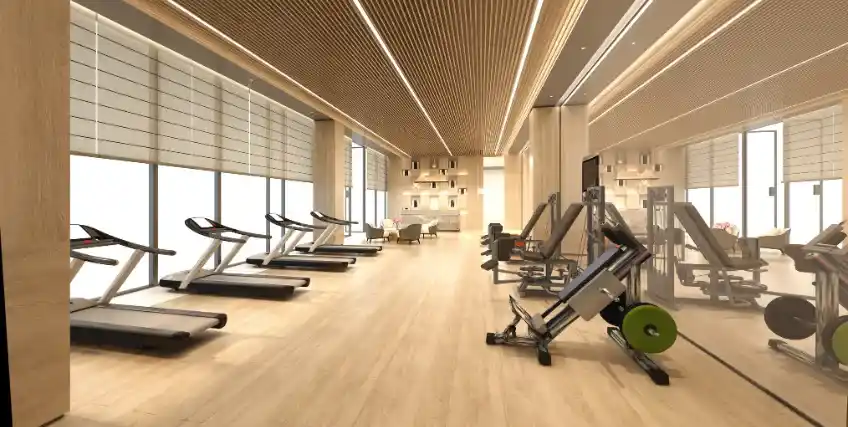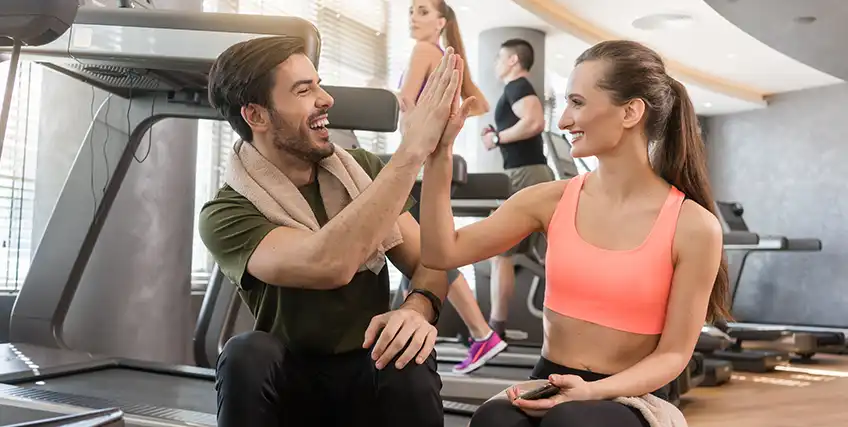Lease vs Buy - Smart Equipment Financing Strategies for Small Fitness Studios
July 14, 2025 | Last Updated on: July 14, 2025

The fitness industry is growing at a rapid pace in the US and in that segment, gym studios are on the top. For the growth of these studios, investing in gym equipment is perhaps one of the most significant financial decisions - especially for small business owners. Whether it is about opening a gym, upgrading one or even expanding personal training space, the total cost is bound to be a lot. High quality workout equipment, such as treadmills, dumbbells, adjustable benches, power racks, and barbells, can put a strain on your working capital.
These are the exact situations where gym equipment financing can help. If you have a solid strategy, you can get the tools your business requires without draining your business cash reserves. But the question here is which path is smarter - leasing gym equipment or buying it outright?
In this article, we break down the real costs, tax implications, and benefits of both options. You'll learn how to align financing with your monthly payments, cash flow, and business goals. We’ll also explore flexible fitness equipment financing plans for start-ups, including ways to finance gym equipment with no credit check and avoid hidden fees.
Whether you’re planning a new location or simply replacing worn-out gear, knowing how to compare gym equipment financing options could save your business thousands.
What Buying and Leasing Really Mean
Upfront Costs
Buying fitness equipment usually means paying a large down payment or the full loan amount upfront. That can eat into your working capital quickly, especially for new fitness business owners. In contrast, leasing gym equipment often requires little or no money down. This leaves more room in your budget for essentials like rent, hiring staff, or marketing. With the right gym equipment financing, you can start strong without draining your reserves.
Depreciation & Resale
Fitness gear, especially cardio machines like treadmills or ellipticals, loses value fast. When you buy, you’re also taking on that depreciation. Reselling used home gym equipment or commercial gear later can be a hassle. With leasing, you avoid those risks. You return the equipment after the term ends and can upgrade. If you’re using gym equipment financing, always weigh depreciation against long-term costs and residual value.
Monthly Cash Flow Impact
If your cash reserve is already strained, then buying equipment can put more pressure on your cash flow, especially if you don't use gym equipment financing. On the other hand, leasing might offer consistent, lower monthly payments. This will make it much easier for you to predict expenses and plan your business growth. You can also have the flexibility to match payment schedules with business cycles. However, when it comes to comparing payment plans, you need to look carefully at the interest rates, fees and payment options as some lenders bury hidden fees in the fine print.
Understand the Possible Tax Perks
NOTE: It is advised to always consult with a tax professional before making any financial decisions.
Section 179 Deductions
Purchasing fitness equipment with a business loan or term financing may qualify for the Section 179 deduction. That means you could deduct the entire loan amount in the year you buy it. This applies to equipment like barbells, free weights, and strength training machines. If you're financing the purchase with gym equipment financing, this tax break could significantly lower your year-end tax bill.
Operating Lease Deductions
With an operating lease, your monthly payments are typically fully deductible as business expenses. This is easier from a bookkeeping perspective; no depreciation tracking or asset calculations. For small business owners just starting out, this can streamline accounting while keeping taxes low. When evaluating gym equipment financing, weigh the simplicity of lease deductions against ownership perks.
Smart Ways to Pay for Gym Gear
Term Loans
Term loans can be suitable if you plan to own the equipment for long-term. These loans come with fixed interest rates and clear monthly payments, which will let you create a predictable budget. But in order to access this funding option, your credit score and eligibility criteria will play a significant role here. If you have a solid profile, you can get the funding at a lower interest rates and competitive payment plans, which will make it easier and affordable for you to invest in high-profile exercise equipment.
Operating & Capital Leases
Leases are flexible and come in two main types: operating and capital. Operating leases are short-term and don’t result in ownership. Capital leases mimic loans; you may own the gear at the end. Most gym equipment financing options include both. Choose based on whether you want eventual ownership or constant upgrades. Leases are ideal if your focus is conserving working capital.
No Credit Check Plans
Don't fret if your credit score is not strong enough. Some providers do allow you to finance gym equipment with no credit check. But keep in mind that these funding options generally come with higher fees and shorter duration. Though they are very valuable for start-ups and newer gyms, it is recommended that you proceed with caution. Look for hidden fees, early payoff penalties and vague or unclear interest rates. You must compare multiple financing options before signing on the dotted lines.
What to Ask Before You Choose
How Long Will You Use the Equipment?
If you expect to replace or upgrade your fitness equipment every 3–5 years, leasing gym equipment might be your best bet. This strategy gives you access to the newest workout equipment without the hassle of resale. It’s ideal for studios offering trendy cardio or strength training classes. For foundational gear like power racks, buying may be smarter.
What's Your Budget and Credit Health?
Tight on working capital or have a low credit score? Leasing may be your only option. If your credit is strong, you’ll get better interest rates and terms with a purchase loan. Consider payment options that include deferred monthly payments or low upfront costs. Look for vendors that provide gym equipment financing with no credit check if you’re just starting out.
Do You Want Ownership?
Buying gives you full control - over use, maintenance, customization, and resale. It’s a better long-term asset if you're building a permanent studio. Leasing means flexibility, but no asset value at the end. Your choice should reflect your studio’s stability, growth projections, and resale outlook.
The Clear Benefits and Drawbacks
Pros of Leasing
- Lower Upfront Cost: Avoid heavy down payments and preserve cash flow
- Newer Gear More Often: Upgrade home gym or commercial gym gear regularly
- Potential Tax Advantages: Simplified deduction of monthly payments
Cons of Leasing
- No Ownership: No resale value or asset building
- Potentially Higher Total Cost: You may pay more over time
- Less Control: Limited customization or brand choice
Conclusion
When it comes to picking between leasing and buying, it is not just about the cost; it is about building a strategy around your goals, budget, and timeline. If your goal is to preserve cash flow, gain access to real-time upgrades, and maintain low monthly payments, leasing gym equipment is a good option as it provides flexibility without a heavy financial burden.
But if you are looking for a long term deal, have a solid credit score and want to build equity then you should think about using gym equipment financing to buy your gear outright as it may offer better long-term value. You will own an asset, potentially qualify for tax deductions and can avoid recurring lease costs, at the same time.
So, whatever your goal might be - outfitting a home gym, scaling your fitness center, or launching a boutique fitness business - you need to choose an option that aligns with your cash flow, business model and growth plan. And in every case, don't forget to read the fine print to look for hidden fees. It is always prudent to compare interest rates and ask about early repayment terms to avoid any nasty surprises in the future.
FAQs on Gym Equipment Financing
1. What is gym equipment financing and how does it work?
Gym equipment financing allows small business owners to lease or purchase fitness equipment through structured monthly payments instead of paying the full price upfront. This type of gym equipment financing options can include term loans, leases, or even no credit check plans, depending on your credit profile, cash flow, and long-term business goals.
2. Is leasing gym equipment better for start-ups?
Leasing gym equipment is often a great option for start-ups with limited working capital. It offers flexibility, lower upfront costs, and fixed monthly payments, helping new studios conserve cash while gaining access to essential workout equipment without the burden of ownership or resale.
3. Can I finance gym equipment with no credit check?
Some lenders and vendors offer gym equipment financing with no credit check, which is ideal for new business owners or those with low credit scores. However, these options may involve higher interest rates or shorter repayment terms. Always review for hidden fees and compare financing solutions carefully.
4. Is buying gym equipment cheaper than leasing in the long run?
Buying is usually cheaper over time, especially when using gym equipment financing with low interest rates. Leasing may seem more affordable upfront but can cost more long term due to recurring payments and the absence of asset ownership. Evaluate total cost over 3–5 years before deciding.
5. Can I switch from leasing to buying later?
Many leasing contracts offer a buyout option at the end of the term. This is common with capital leases, where your monthly payments contribute to eventual ownership. If you're unsure about long-term commitment, leasing gym equipment with a buyout clause offers flexibility.
Frequent searches leading to this page
Term Loans are made by Itria Ventures LLC or Cross River Bank, Member FDIC. This is not a deposit product. California residents: Itria Ventures LLC is licensed by the Department of Financial Protection and Innovation. Loans are made or arranged pursuant to California Financing Law License # 60DBO-35839




